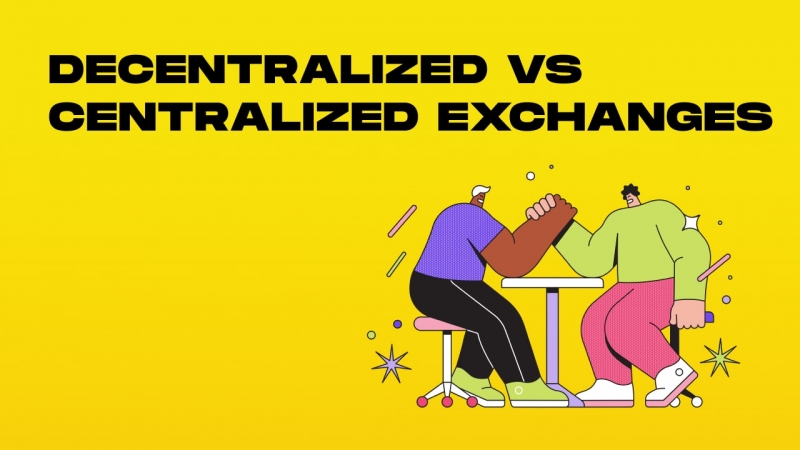Understanding the Difference between Decentralized and Centralized Exchanges
Crypto exchanges come in two distinctly different formats:
1. Decentralized exchanges where traders barely interact with middlemen and search for trading partners on their own. In some cases, the administration of the platform acts as a guarantor and provides escrow services.
2. Centralized exchanges which are institutionalized organizations offering a wide range of different financial products often similar to brokers and traditional stock exchanges.
The former focus strictly on peer-to-peer trading and emphasize the importance of complete decentralization of the financial industry while the latter takes your funds into custody and conducts operations just like any other financial institution.
While there are advantages and disadvantages to both types of platforms, the recent trend to move away from centralized exchanges in favor of decentralized finance has been quite strong. The issue is that CEX companies require users to keep their funds on the exchange which creates many risks for investors as the crypto industry is still unregulated.
The FTX collapse showed that even the biggest centralized exchanges are not immune to problems that traditionally plague corrupted centralized institutions. Despite the risks, the vast majority of crypto investors and traders prefer using CEX platforms due to increased convenience, instant order execution, and higher liquidity.
The Pros of Decentralized Exchanges
Many crypto enthusiasts believe that using DEX platforms is the only good way to preserve the philosophy of total decentralization of the economy. Some even think that centralized exchanges ruin the very idea of cryptocurrencies and lay an unnecessary level of control where there should be none.
It is true that decentralized platforms provide more freedom and reliability to cryptocurrency investors, but they also have unique risks and do not offer the same level of convenience and speed as their centralized counterparts. What are the advantages of using DEX platforms?
Increased Security and Privacy
The biggest advantage of using a DEX platform is the unmatched level of privacy in decentralized exchanges since these marketplaces do not adhere to KYC (know your customer) policies and do not require traders to verify their identities. On the other hand, the lack of information creates a very real risk of losing money in a bad trade as your partner can simply take your money and disappear. Trustless transactions can be dangerous on their own.
Some traders think that the decentralized exchange security is the main factor. You don’t have to send your money to a middleman. Instead, you can trade only from a special wallet address dedicated to contacting with the outer world. Your main assets can be safely stored in a cold storage far away from various cyber risks and other threats.
No middleman
Peer-to-peer trading is a very appealing concept to people who hate the very concept of middlemen in financial operations. Using decentralized exchanges where all traders are equal to one another and can complete transactions without the need of any overseeing authority is the biggest difference between a centralized institution and a DEX platform.
However, eliminating intermediaries in crypto transactions can be dangerous. The lack of any oversight often leads to issues with fraudulent activity, scammers, and bad user experience in general.
Censorship Resistance
The international sanctions and economic bans that affected Iran, Russian Federation, and some other countries showed the world two things:
1. When countries push together, they can do some serious economic damage to any wrongdoers.
2. It is possible to completely isolate an economy and its participants from the global financial system.
Many libertarians and people who simply do not like the idea of total governmental control despise the idea of imposing any limitations on people’s finances even when such measures seem justified. Cryptocurrencies and decentralized trading help in avoiding censorship or restrictions on trading activities.
User control
One of the mottos of the Bitcoin community is “not your keys, not your crypto”. The saying refers to the necessity to hold your tokens in a wallet and storing keys in a safe location. Owning private keys and controlling funds directly with wallets is the only way to ensure that your tokens are protected from any danger.
No Single Point of Failure
Decentralized trading means that the funds are not held in a single wallet as in case with centralized exchanges. A distributed network ensures no single point of failure or vulnerability as there is no CEO that can misplace clients’ money or a place where all data is stored and can be compromised.
The Cons of Decentralized Exchanges
Despite many apparent advantages, DEX platforms have downsides that make them less popular compared to centralized exchanges offering more services, products, and a higher level of convenience to all users.
Limited Liquidity
Finding a suitable trade partner can be a hassle. All decentralized platforms face challenges with order book depth and liquidity. In many cases, there are not enough active traders interested in swapping assets to create the necessary level of liquidity in the local market to facilitate trades.
User Experience
Since many peer-to-peer transactions have to be conducted directly between users, the whole process requires some level of technical expertise on the part of each of traders participating in an operation. The user interface complexity and learning curve for non-technical users is a significant barrier that prevents many investors from using DEX platforms.
Risk of Smart Contract Vulnerabilities
Some networks release smart-contracts that have bugs or exploits. Potential vulnerabilities in smart contracts used by decentralized exchanges significantly reduce the level of safety and present unforeseen risks.
The Advantages of Centralized Exchanges
CEX platforms are much better if you believe that convenience and speed are much more important than privacy and decentralization. Many centralized exchanges provide a wide range of services to their clients and offer unique money-making opportunities. Despite what many crypto enthusiasts say about the industry, the vast majority of people are in it for the money and nothing else.
CEX platforms can be integrated with different third-party providers offering unique trading instruments. For example, if you need to run an automated trading system, you can simply use an automation vendor like WunderTrading and connect to any popular exchange.
Why do people flock to centralized platforms?
User experience
Developers polish user interfaces and make all process streamlined to ensure that users have a good time browsing the order book on the spot market or evaluating prices of futures. Since your money is with the exchange, you can manage the portfolio and make changes quickly since you don’t need to search for a trade partner.
Faster transactions
The spot market is a good place to quickly swap assets. You don’t need to look for traders with suitable counter offers or manually send and receive tokens. Instead, you simply place an order which will be executed instantly given there is enough liquidity in the market.
Higher liquidity
Market activity is higher on most centralized exchanges even if it is a relatively small platform. Market-making is something that all exchanges engage in. This activity is not healthy for the industry and allows some exchanges to report higher liquidity numbers. On the other hand, market-making drives up the interest from traders and ensures that all orders are fulfilled in a timely fashion.
Integrations with other platforms
Many contemporary retail traders prefer using advanced trading instruments like automation, social trading, and more. Centralized exchanges usually have functional APIs allowing third-party service providers to directly connect and place orders on behalf of their users. This interconnectedness creates a perfect environment for trading bots and better analytics.
Stronger regulation
Many centralized exchanges abide by KYC and AML policies while operating under the supervision of local authorities. If you are concerned with safety and want to be sure that you won’t lose money to an unreliable platform, you can choose one of many regulated CEX companies.
Regulation is not something evil as imagined by DEX enthusiasts. It is necessary to protect the general population and people who are not as well versed in the world of crypto as early adopters.
The Disadvantages of Centralized Exchanges
It is easy to see all the pros of using CEX platforms especially if you are serious about trading crypto for profit by using all available trading instruments like automation and in-depth analytics. However, some people believe that centralized exchanges have distinct weaknesses and vulnerabilities that make them inferior to DEX marketplaces.
Potential corruption
One of the biggest stories in the whole financial world in 2023 was the collapse of the FTX exchange, a large financial institution which seemed too big to fail. A lengthy investigation revealed that the company was poorly managed, client funds were frivolously used, and huge sums of money were stolen or lost in bad trades initiated by the high management of FTX and associated with it Alameda Research.
The potential corruption in the management of centralized exchanges is one of the biggest risks that many crypto enthusiasts rightfully consider quite destructive for the whole industry.
Incomplete regulatory mechanisms
While the decision of some CEX platforms to adhere to local regulations in Europe and Asia has been a good sign for the crypto community, the imperfection of the law makes it hard to regulate the industry as efficiently as t is necessary. For example, the SEC is still battling Ripple and tries to convince the government that cryptocurrencies are securities.
We simply do not have the legal framework to deal with many challenges presented by the rapidly growing crypto industry.
No transparency
Centralized exchanges are not forced by law to reveal their books or undergo audits by independent accountants. We do not know the level of solvency of many centralized entities, their assets, or how they operate. Trusting a company that you don’t know much about is a risk that cannot be underestimated!
DEX and CEX Platforms: Which Are Better?
Both types of exchanges have their unique pros and cons. If you are interested in long-term holding of crypto assets, using decentralized platforms for occasional trades and storing your coins in cold storage seems like the best course of action. DEX platforms do provide privacy and the ability to directly trade resources which is something that many long-term investors will appreciate.
People who want to employ the whole range of available trading instruments to make as much money as possible should focus on trading on centralized exchanges where they will have the necessary level of speed and convenience to capitalize on price changes. However, the aforementioned issues with transparency and potential corruption should not be ignored.
Ultimately, it is up to you to choose which type of exchange to use for your investment purposes, just be careful and diligently research them!
























